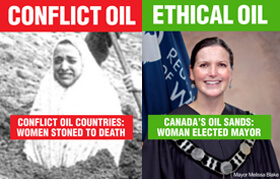The “Ethical Oil” advertising website promoting Canadian tar sands was launched last month. Neocon political communications advisor Alykhan Velshi’s rebrand of tar sands draws up a myth of “ethical oil” in opposition to the so-called “conflict oil” elsewhere in the world. It looks at first like a Yes Men-style parody of some of the pro-tar sands PR coming out of Canada targeting EU and US markets. But it is indeed part of that same project to push the tar sands – and here’s my top five reasons why Velshi’s ad campaign is a seriously dirty trick:
1. First up the tar sands are not simply not “ethical oil” on human rights or ecological grounds. They are are said to violate Indigenous Peoples treaty rights in Alberta. They have been called “the most environmentally destructive project on earth.”
2. The website is full of stolen and faked images – a story Rainforest Action Network broke yesterday. This shocker reveal less than a month after the site launch significantly undermines any shred of integrity it might have had. But Velshi is powering on with Ezra Levant‘s meme regardless – the power of spin is in its constant repetition.
 3. The images claiming that “ethical oil” is evidenced by womens’ and gay rights in Canada exploits the political struggles of these groups. It is a blatant cover-up tactic, titled “pinkwash” by LGBTQI Israeli activists accusing their government of using their struggle “to show Israel as a liberal and enlightened state, making the Israeli LGBT community an accomplice to land theft, Apartheid, occupation, oppression of the Palestinian people, and committing war crimes.” (scroll down to English below Hebrew, Arabic and Russian). The ethicaloil.org advertising campaign’s images of womens’ rights (above) uses a stolen still from a film, and of gay rights (pitting “persecution” vs “pride”) chooses to ignore recent attention on gay teen suicides in the North American continent.
3. The images claiming that “ethical oil” is evidenced by womens’ and gay rights in Canada exploits the political struggles of these groups. It is a blatant cover-up tactic, titled “pinkwash” by LGBTQI Israeli activists accusing their government of using their struggle “to show Israel as a liberal and enlightened state, making the Israeli LGBT community an accomplice to land theft, Apartheid, occupation, oppression of the Palestinian people, and committing war crimes.” (scroll down to English below Hebrew, Arabic and Russian). The ethicaloil.org advertising campaign’s images of womens’ rights (above) uses a stolen still from a film, and of gay rights (pitting “persecution” vs “pride”) chooses to ignore recent attention on gay teen suicides in the North American continent.
4. The site calls on the visitor to donate, take action and become a member – not because Velshi needs the money, but because styling the site like an activist campaign buys it a guise of integrity. This tactic is reminiscent of the pro-Heathrow expansion group Future Heathrow, slyly set up as a fake grassroots front by the Institute of Ideas.
5. The polarisation of “ethical oil” vs “conflict oil” is false. It craftily sidesteps the influence of corporations and governments from liberal democracies on the conflicts cited and in some cases the regimes that preceded them. As Leo Hickman points out in his Guardian Environment blog, the Chinese oil companies that Velshi categorises as “conflict oil” (Sinopec and CNOOC) have bought stakes in or bought out the supposed “ethical oil” companies (Syncrude and OPTI Canada respectively), crossing the divide and blurring the binary. As for governments, the case of Canadian tar sands serves only to demonstrate that extraction in a liberal democracy can be equally as destructive to communities, ecosystems and climate as anywhere else in the world.